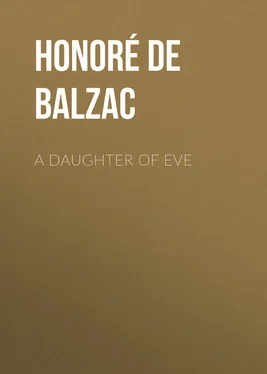Honoré Balzac - A Daughter of Eve
Здесь есть возможность читать онлайн «Honoré Balzac - A Daughter of Eve» — ознакомительный отрывок электронной книги совершенно бесплатно, а после прочтения отрывка купить полную версию. В некоторых случаях можно слушать аудио, скачать через торрент в формате fb2 и присутствует краткое содержание. Жанр: literature_19, foreign_antique, foreign_prose, на английском языке. Описание произведения, (предисловие) а так же отзывы посетителей доступны на портале библиотеки ЛибКат.
- Название:A Daughter of Eve
- Автор:
- Жанр:
- Год:неизвестен
- ISBN:нет данных
- Рейтинг книги:5 / 5. Голосов: 1
-
Избранное:Добавить в избранное
- Отзывы:
-
Ваша оценка:
- 100
- 1
- 2
- 3
- 4
- 5
A Daughter of Eve: краткое содержание, описание и аннотация
Предлагаем к чтению аннотацию, описание, краткое содержание или предисловие (зависит от того, что написал сам автор книги «A Daughter of Eve»). Если вы не нашли необходимую информацию о книге — напишите в комментариях, мы постараемся отыскать её.
A Daughter of Eve — читать онлайн ознакомительный отрывок
Ниже представлен текст книги, разбитый по страницам. Система сохранения места последней прочитанной страницы, позволяет с удобством читать онлайн бесплатно книгу «A Daughter of Eve», без необходимости каждый раз заново искать на чём Вы остановились. Поставьте закладку, и сможете в любой момент перейти на страницу, на которой закончили чтение.
Интервал:
Закладка:
Honoré de Balzac
A Daughter of Eve
To Madame la Comtesse Bolognini, nee Vimercati.
If you remember, madame, the pleasure your conversation gave to a traveller by recalling Paris to his memory in Milan, you will not be surprised to find him testifying his gratitude for many pleasant evenings passed beside you by laying one of his works at your feet, and begging you to protect it with your name, as in former days that name protected the tales of an ancient writer dear to the Milanese.
You have an Eugenie, already beautiful, whose intelligent smile gives promise that she has inherited from you the most precious gifts of womanhood, and who will certainly enjoy during her childhood and youth all those happinesses which a rigid mother denied to the Eugenie of these pages. Though Frenchmen are taxed with inconstancy, you will find me Italian in faithfulness and memory. While writing the name of “Eugenie,” my thoughts have often led me back to that cool stuccoed salon and little garden in the Vicolo dei Cappucini, which echoed to the laughter of that dear child, to our sportive quarrels and our chatter. But you have left the Corso for the Tre Monasteri, and I know not how you are placed there; consequently, I am forced to think of you, not among the charming things with which no doubt you have surrounded yourself, but like one of those fine figures due to Raffaelle, Titian, Correggio, Allori, which seem abstractions, so distant are they from our daily lives.
If this book should wing its way across the Alps, it will prove to you the lively gratitude and respectful friendship of
Your devoted servant,
De Balzac.
CHAPTER I. THE TWO MARIES
In one of the finest houses of the rue Neuve-des-Mathurins, at half-past eleven at night, two young women were sitting before the fireplace of a boudoir hung with blue velvet of that tender shade, with shimmering reflections, which French industry has lately learned to fabricate. Over the doors and windows were draped soft folds of blue cashmere, the tint of the hangings, the work of one of those upholsterers who have just missed being artists. A silver lamp studded with turquoise, and suspended by chains of beautiful workmanship, hung from the centre of the ceiling. The same system of decoration was followed in the smallest details, and even to the ceiling of fluted blue silk, with long bands of white cashmere falling at equal distances on the hangings, where they were caught back by ropes of pearl. A warm Belgian carpet, thick as turf, of a gray ground with blue posies, covered the floor. The furniture, of carved ebony, after a fine model of the old school, gave substance and richness to the rather too decorative quality, as a painter might call it, of the rest of the room. On either side of a large window, two etageres displayed a hundred precious trifles, flowers of mechanical art brought into bloom by the fire of thought. On a chimney-piece of slate-blue marble were figures in old Dresden, shepherds in bridal garb, with delicate bouquets in their hands, German fantasticalities surrounding a platinum clock, inlaid with arabesques. Above it sparkled the brilliant facets of a Venice mirror framed in ebony, with figures carved in relief, evidently obtained from some former royal residence. Two jardinieres were filled with the exotic product of a hot-house, pale, but divine flowers, the treasures of botany.
In this cold, orderly boudoir, where all things were in place as if for sale, no sign existed of the gay and capricious disorder of a happy home. At the present moment, the two young women were weeping. Pain seemed to predominate. The name of the owner, Ferdinand du Tillet, one of the richest bankers in Paris, is enough to explain the luxury of the whole house, of which this boudoir is but a sample.
Though without either rank or station, having pushed himself forward, heaven knows how, du Tillet had married, in 1831, the daughter of the Comte de Granville, one of the greatest names in the French magistracy, – a man who became peer of France after the revolution of July. This marriage of ambition on du Tillet’s part was brought about by his agreeing to sign an acknowledgment in the marriage contract of a dowry not received, equal to that of her elder sister, who was married to Comte Felix de Vandenesse. On the other hand, the Granvilles obtained the alliance with de Vandenesse by the largeness of the “dot.” Thus the bank repaired the breach made in the pocket of the magistracy by rank. Could the Comte de Vandenesse have seen himself, three years later, the brother-in-law of a Sieur Ferdinand DU Tillet, so-called, he might not have married his wife; but what man of rank in 1828 foresaw the strange upheavals which the year 1830 was destined to produce in the political condition, the fortunes, and the customs of France? Had any one predicted to Comte Felix de Vandenesse that his head would lose the coronet of a peer, and that of his father-in-law acquire one, he would have thought his informant a lunatic.
Bending forward on one of those low chairs then called “chaffeuses,” in the attitude of a listener, Madame du Tillet was pressing to her bosom with maternal tenderness, and occasionally kissing, the hand of her sister, Madame Felix de Vandenesse. Society added the baptismal name to the surname, in order to distinguish the countess from her sister-in-law, the Marquise Charles de Vandenesse, wife of the former ambassador, who had married the widow of the Comte de Kergarouet, Mademoiselle Emilie de Fontaine.
Half lying on a sofa, her handkerchief in the other hand, her breathing choked by repressed sobs, and with tearful eyes, the countess had been making confidences such as are made only from sister to sister when two sisters love each other; and these two sisters did love each other tenderly. We live in days when sisters married into such antagonist spheres can very well not love each other, and therefore the historian is bound to relate the reasons of this tender affection, preserved without spot or jar in spite of their husbands’ contempt for each other and their own social disunion. A rapid glance at their childhood will explain the situation.
Brought up in a gloomy house in the Marais, by a woman of narrow mind, a “devote” who, being sustained by a sense of duty (sacred phrase!), had fulfilled her tasks as a mother religiously, Marie-Angelique and Marie Eugenie de Granville reached the period of their marriage – the first at eighteen, the second at twenty years of age – without ever leaving the domestic zone where the rigid maternal eye controlled them. Up to that time they had never been to a play; the churches of Paris were their theatre. Their education in their mother’s house had been as rigorous as it would have been in a convent. From infancy they had slept in a room adjoining that of the Comtesse de Granville, the door of which stood always open. The time not occupied by the care of their persons, their religious duties and the studies considered necessary for well-bred young ladies, was spent in needlework done for the poor, or in walks like those an Englishwoman allows herself on Sunday, saying, apparently, “Not so fast, or we shall seem to be amusing ourselves.”
Their education did not go beyond the limits imposed by confessors, who were chosen by their mother from the strictest and least tolerant of the Jansenist priests. Never were girls delivered over to their husbands more absolutely pure and virgin than they; their mother seemed to consider that point, essential as indeed it is, the accomplishment of all her duties toward earth and heaven. These two poor creatures had never, before their marriage, read a tale, or heard of a romance; their very drawings were of figures whose anatomy would have been masterpieces of the impossible to Cuvier, designed to feminize the Farnese Hercules himself. An old maid taught them drawing. A worthy priest instructed them in grammar, the French language, history, geography, and the very little arithmetic it was thought necessary in their rank for women to know. Their reading, selected from authorized books, such as the “Lettres Edifiantes,” and Noel’s “Lecons de Litterature,” was done aloud in the evening; but always in presence of their mother’s confessor, for even in those books there did sometimes occur passages which, without wise comments, might have roused their imagination. Fenelon’s “Telemaque” was thought dangerous.
Читать дальшеИнтервал:
Закладка:
Похожие книги на «A Daughter of Eve»
Представляем Вашему вниманию похожие книги на «A Daughter of Eve» списком для выбора. Мы отобрали схожую по названию и смыслу литературу в надежде предоставить читателям больше вариантов отыскать новые, интересные, ещё непрочитанные произведения.
Обсуждение, отзывы о книге «A Daughter of Eve» и просто собственные мнения читателей. Оставьте ваши комментарии, напишите, что Вы думаете о произведении, его смысле или главных героях. Укажите что конкретно понравилось, а что нет, и почему Вы так считаете.












